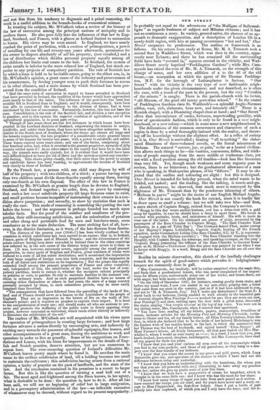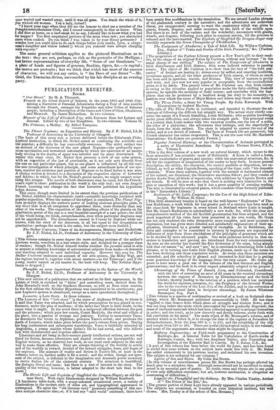ORR STREET
Is probably not equal to the adventures of "the Mulligan of Ballymul- ligan " as regards freshness of subject and Milesian richness ; and it has not so continuous a story. In variety, general satire, the absence of an ap- proach to dramatic exaggeration, and a description of London life in a newly-built region, with hits at passing occurrences " hot and hot," Our Street surpasses its predecessor. The outline or framework is as follows. On his return from study at Rome, Mr. M. A. Titmarsh took a second floor in Waddilove Street, which was then in the country, appa- rently near Tyburn; and there he has remained till the surrounding fields have been " covered in," squares erected in the vicinity, and Wad- dilove Street newly baptized "Pocklington Gardens" ; while Mrs. Cam- mysole has raised the rent of Mr. M. A. Titmarsh, on the strength of this change of name, and her own addition of A to the 46 of the old house,—an usurpation at which the agent of Sir Thomas Poekling- ton, M P. for the borough of Lathanplaster is furious. Our Street" with its vicinity is the very type of new fashionable neigh- bourhoods under the given circumstances; and not described, as is often the case, with a touch of the past in the present, but the very " Cynthia of the minute " is caught. There is the parish-church with its rector, " old Slocum, of the good old tawny port-wine school." " In the centre of Pocklingtou Gardens rises St. Waltheofs's—a splendid Anglo-Norman edifice, vast, rich, elaborate, bran new, and intensely old." There is a Romish chapel, with a Dissenting chapel close at hand ; and "Our Street" offers that intermixture of ranks, fortunes, unpretending gentility, with show of questionable fashion, which is only to be found in a new neigh- bourhood, or a new colony—which in some sense a new neighbourhood is. The delineations of the common occurrences and characters of such a region is done by a mind thoroughly imbued with the reality, and throw- ing off its knowledge without the slightest effort. As a reflex of society as it is, Our Street is unrivalled ; beating "all to nothing" the elabo- rated flimsiness of three-volumed novels, or the literal minuteness of Dickens. The natural "sorrow, joy, or pain," so far as a heated civiliza- tion allows such things to be—the vanities, coarseness, follies, and trick- eries of people emerging from the mere middle or tradesman class, yet not with a fixed position among the old families—look less like literature than very life. Yet, though much weakness and some roguery pass in review, there is no bitterness; but the goodnatured allowance of a man who is speaking, in Shaksperian phrase, of his "fellows." It may be ob- jected that the outline and colouring are slight : but this is designed. Our Street is intended for holyday perusal, when the mind wants to be tickled, not tasked; and the reading, like the talking, is touch-and-go. It should, however, be observed, that much more is conveyed by this slightness of Mr. Titmarsh than by the ponderous labouring of others. "Multum in parvo" might be the motto of our English Michael Angelo. Our Street is not exactly the book for extract, since it is hardly fair to draw upon so small a volume: but we will take two bits—and first,
a mere sketch of Captain Bragg, retired from the Company's service. "Bragg to this day wears anchor-buttons, and has a dress-coat with a gold strap for epaulets in case he should have a fancy to sport them. His house is covered with portraits, busts, and miniatures of himself. His wife is made to wear one of the latter. On his sideboard are pieces of plate, presented by the passengers of the Ram Chunder to Captain Bragg. The Rain Chunder East ndiaraan, in a gale off Table Bay '; The Outward-bound Fleet, under convoy of her Majesty's frigate Loblollyboy, Captain Gulch, beating off the French squadron, under Commodore Leloup (the Ram Chuhder, S.E. by E., is represent- ed engaged with the Mirliton corvette)'; 'The Ram Chunder standing into the Hooghly, with Captain Bragg, his telescope, and speaking-trumpet, on the poop '; Captain Bragg presenting the Officers of the Ram Chunder to General Bona- parte at St. Helena'—Tirsiansit (this fine piece was painted by me when I was in favour with Bragg); in a word, Bragg and the Ram Chunder are all over the house."
Besides its minute observation, this sketch of the landlady challenges remark for the spirit of good-nature which pervades it : lodginghouse- keepers are commonly done in gall.
"Mrs. Cammysole, my landlady, will be rather surprised when she reads this,. and finds that a goodnatured tenant, who has never complained of her imposi- tions for fifteen years, understands every one of her tricks, and treats them, not with anger, but with scorn—with silent scorn. "On the 18th of December 1837, for instance, coming gently down stairs, and before my usual wont, I saw you seated in my arm-chair, peeping into a letter that came from my aunt in the country, just as if it had been addressed to.your and not to 'M. A. 'fitmarsh, Esq.' Did I make any disturbance? far from it: L slunk back to my bedroom, (being enabled to walk silently in the beautiful pair of worsted slippers Miss Penelope J—s worked for me; they are worn out now, dear Penelope!) and then, rattling open the door with a great noise, descended the stairs, singing 'Son vergin vezzosa' at the top'of my voice. You were not in my sitting-aroom, Caimngmyaslcider,IlywtennteIrsenteparWperothat apnaurrntst., brouilions or verses, inchoate articles for the Morning Post and,Morning manuscripts, invita- tions to dinner and tea all my family letters, all Eliza Townley's letters, from the first, in which she declared that to be the bride of her beloved Michelangelo WAS the fondest wish of her maiden heart, to the last, in which she announced that her Thomas was the best of husbands, and signed herself Eliza Slogger '; all Mary Farmer's letters, all Emily Delamere's, all that poor foolish old Miss Mac - whirter's, whom I would as soon marry as —; in a word, I know that you, you hawk-beaked, keen-eyed, sleepless, indefatigable, old Mrs. Cammysole, have read all my papers for these ten years.
" I know that you cast your curious old eyes over all the manuscripts which you find in my coat-pockete, and those of my pantaloons, as they hang in a dra- pery over the door-handle of my bedroom.
"I know that you count the money in my green and gold purse, which Lucy Netterville gave me and speculate on the manner in winch I have laid out the
difference between me, and yesterday. "I know that yon have an understanding with the laundress, (to whom you. say that you are all-powerful with me,) threatening to take away my practice from her, unless she gets up gratis some of your fine linen. "1 know that we lxth have a pennyworth of cream for breakfast, which is brought in in the same little can; and I know who has the most for her share. "t know how many lumps of sugar you take from each pound as it arrives. I have counted the lumps, you old thief, and for years have never said a word, ex- cept to Miss Clapperclaw, the first-ffior lodger. Once I put a bottle of pale brandy into that cupboard, of which you and I only have the keys; and the li- quor wasted and wasted away, until it was all gone. You drank the whole of it, you wicked old woman. You a lady, indeed
" I know your rage when they did me the honour to elect me a member of the Poluphloishoiothalasses Club, and I ceased consequently to dine at home. When I did dine at borne, on a beef-steak let us say, I should like to know what yen had for supper? You first amputated portions of the meat when raw; you abstracted more when cooked. Do you think I was taken in by year flimsy pretences? I wonder how you could dare to do such things before year maids, (you, a cler, man's daughter and widow indeed !) whom you yourself were always cha
with roguery."
The same general criticism applies to the pictured illustrations as to the text : they are not, perhaps, 80 rich as the portraits of the Mulligan ; but better representations of everyday life. "Souse of our Gentlemen "— a plate of heads and figures of grooms, flunkies, tigers, &c.—is capital ; the mutes are portraits; but we think that which has most of the essence of character, we will not say satire, is "the Dove of our Street "—Mr. Oriel, the Tractarian divine, surrounded by his fair disciples at an evening party.































 Previous page
Previous page